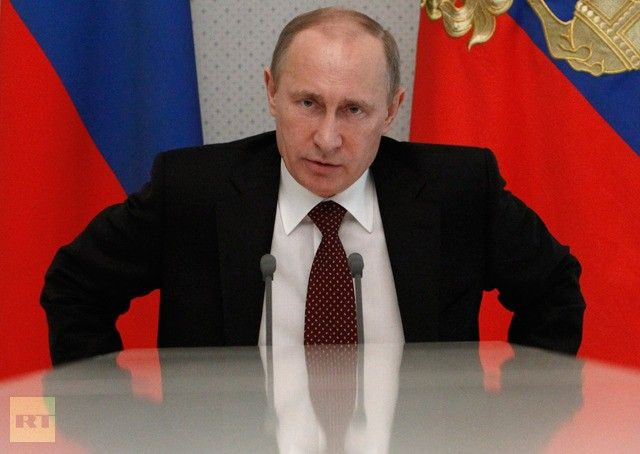Vladimir Putin Depicted a Thief as New Book Claims KGB, Mafia Personalities Rule Russia

Before Russian President Vladimir Putin became a dominant political figure, he reportedly oversaw the theft of $4 billion starting in 1991. The state-owned money was spirited out of Russia and made its way back a decade later to fund Putin's rise to power.
Putin, however, was not acting alone. He once held the rank equivalent to Lieutenant Colonel in the KGB, Russia's intelligence service, then headed the FSB, which replaced the former when the Soviet Union was dissolved.
Putin and his KGB cronies are practically the absolute rulers of Mother Russia.
This according to Anne Applebaum in a review of the book "Putin's Kleptocracy: Who Owns Russia?" by Karen Dawisha.
Writing for The New York Review of Books, Applebaum sifted through the claims that Dawisha had highlighted, backed by "mass of evidence," which traced Putin's silent years as a career KGB officer, the FSB chief, the mayor of St Petersburg, the Russian prime minister in 1999 and ultimately the nation's president in 2000.
$4 billion journey to power
However, as Dawisha wrote, fate was not exactly kind to Putin. Putin manipulated fate and his march to Kremlin begun when Mikhail Gorbachev became the Soviet Premier and instituted reforms that made the KGB restless - wary of losing power and influence.
The KGB tried to neutralize Gorbachev in the early 1990s but failed so the group focused instead on beefing up the future. The KGB stashed away $4 billion of Soviet money and grew it with the help of Swiss and British bankers, according to Dawisha.
That same money bankrolled the KGB's aim of regaining prominence in Russian landscape -socially, politically and economically. It was unclear how he maneuvered his way to the top but Putin emerged as the power group's banner figure, Dawisha said.
Russian democracy the Putin way
When Boris Yeltsin, who succeeded Gorbachev, became ill, Putin presented himself before Russia's kingmakers as a champion of democracy. Convincing enough, Putin and his group captured the Kremlin and implemented counter-reforms to secure his grip on power.
"I conclude that from the beginning Putin and his circle sought to create an authoritarian regime ruled by a close-knit cabal ... who used democracy for decoration rather than direction," Dawisha was quoted by the report as saying.
Criminal ties
That the Russian president has mafia and KGB buddies to implement his plans with little or no tolerance for dissent was proven by high-profile cases of abuse of authority and even murder.
Dawisha pointed to the case of Mikhail Khodorkovsky, once Russia's richest man but had the misfortune of earning Putin's ire. Khodorkovsky was imprisoned in 2003 and his Yukos oil company was seized and turned over to known Putin friends. The billionaire was recently released but opted to keep quiet.
Journalist Anna Politkovskaya was not too lucky. Unlike Khodorkovsky, Politkovskaya was silenced forever for criticizing Putin on his actions during Russia's tussle with Chechnya. The brutal murder, including Khodorkovsky's persecution, were stark reminders of how ruthless Putin can get.
Or how great power rests, as asserted by Dawisha, on one man who stole his way to the top and one day could trigger a nuclear showdown or World War 3 with the United State just by invading Ukraine.





















